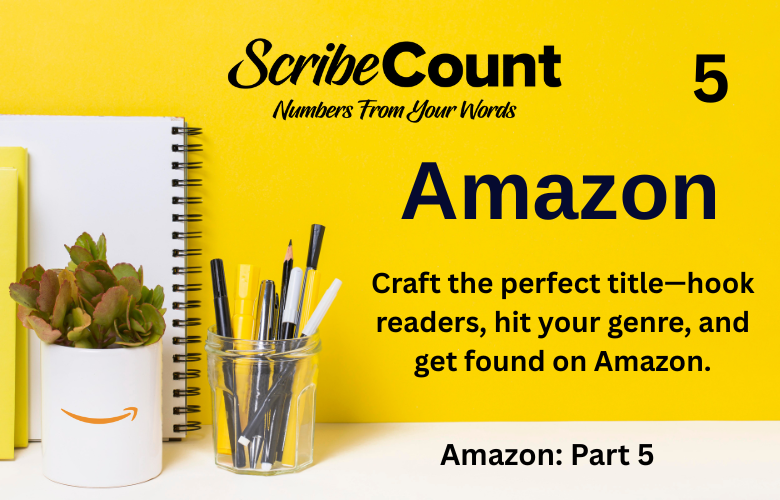Choosing the Right Title for Your Self-Published Book on Amazon: An Author’s Guide to Intrigue, Genre, and Discoverability
For self-publishing authors, particularly on platforms like Amazon, the book title is one of the most important creative and marketing decisions they will make. A compelling title not only encapsulates the soul of the story but also acts as a beacon to draw readers in. In a marketplace saturated with millions of titles, your book’s name is your first impression—your handshake to potential readers. Selecting the right one requires a strategic blend of artistry, psychology, and marketing acumen.
Why a Good Title Matters
A title serves multiple roles. It intrigues, informs, and entices. On Amazon, where countless books compete for attention, your title must stand out in a thumbnail, carry emotional or intellectual weight, and give readers enough information to know whether it’s the kind of story they want to explore. In many ways, your title is your book's first pitch. It needs to evoke curiosity, convey tone, and hint at the genre, all while being short enough to remember and unique enough to stand apart.
The Role of Genre and Story Theme
Genre is the compass by which readers navigate the literary sea. Titles that reflect their genre clearly will perform better because they align with reader expectations. A cozy mystery might use whimsical or pun-laden titles ("Murder in the Margins"), while a dark psychological thriller may lean toward stark, minimalist names ("The Silent Wife"). Knowing your book’s genre and subgenre is crucial because each comes with its own titling conventions, tone, and reader expectations.
Alongside genre, the story’s core theme should guide the title selection. Is the central conflict about love overcoming adversity, a quest for redemption, or a battle for survival? A good title will echo that emotional or thematic core. Titles that include or suggest the protagonist, the setting, or the nature of the conflict can be especially powerful.
Titles That Evoke Interest, Character, and Conflict
A great title should spark curiosity. It should make the reader ask questions: Who is that? Why is this happening? What’s going on in that world? Including elements of the character or setting—especially when they are unique or evocative—can help anchor the reader and stir intrigue. Conflict, too, is a powerful driver. A title that hints at danger, desire, or drama gives readers a reason to click “Look Inside.”
Consider these examples:
-
Romance: The Hating Game by Sally Thorne – This title immediately suggests emotional conflict and a potential enemies-to-lovers dynamic.
-
Thriller: Gone Girl by Gillian Flynn – The mystery of a woman who has vanished, paired with the ambiguity of the title, creates immediate suspense.
-
Fantasy: A Court of Thorns and Roses by Sarah J. Maas – The lyrical yet dangerous imagery evokes both fantasy and romantic tension.
-
Mystery: The Girl with the Dragon Tattoo by Stieg Larsson – Unique character + mystery = instant interest.
These titles work because they follow the 5-6 titling convention: five to six words that deliver tone, theme, and curiosity. This length is optimal for Amazon listings, balancing clarity with punch.
How Cover Art Supports the Title
A brilliant title can be weakened by poor cover design. Conversely, great cover art can elevate a decent title. The two must work together. The title sets the hook, but the cover art confirms the genre and promises the mood. A mismatch—say, a gothic-sounding title paired with a cheerful cartoon cover—will confuse readers and hurt conversions.
Meeting Reader Expectations
Reader expectations are sacred. If your title promises suspense, readers will expect pacing, danger, and twists. If it promises fantasy, readers expect a new world, magic, or lore. Misleading titles erode trust and generate poor reviews. A good title not only attracts your ideal reader—it helps repel the wrong ones.
One-Word Titles and Their Effectiveness
One-word titles like It, Twilight, Outlander, or Dune can be immensely powerful—but only if the word is evocative, memorable, and contextually supported by strong branding and marketing. For debut authors, these can be risky. Without a well-known name, a one-word title might be too vague to anchor a reader's curiosity unless it's highly unusual or genre-revealing.
The Power of Conflict
Conflict fuels narrative—and great titles hint at that tension. Titles that suggest betrayal (Before We Were Strangers), danger (Behind Closed Doors), or emotional stakes (Me Before You) draw in readers who crave drama. If your title teases the “what could go wrong?” of the story, it often results in a click.
Using AI to Brainstorm Book Titles
AI can be a powerful tool to brainstorm titles. By inputting your story’s genre, themes, key plot points, and tone, AI can generate dozens of options, helping you find a match or inspire a better one.
Sample prompt for ChatGPT or other AI tools:
"Generate 15 book title ideas for a romantic suspense novel set in a coastal town, featuring a woman with a secret past and a man investigating a local crime. The tone should be mysterious but emotionally engaging."
Book Title Generators: What They Are and How to Use Them
Book name generators are online tools that generate titles based on keywords, genre, or random inputs. Many are categorized by genre to reflect titling conventions specific to romance, sci-fi, mystery, and fantasy.
Step-by-Step to Use One:
-
Choose a generator based on your genre.
-
Input key details: genre, character names, setting, themes.
-
Review a list of generated titles.
-
Copy the ones that spark ideas.
-
Modify or combine titles for uniqueness and precision.
Top 5 Book Title Generators by Genre
Romance
Thriller
Fantasy
Mystery
Amazon Rules and Title Requirements
Amazon has specific requirements for how titles appear in the product listing:
-
The title must match the title on your book’s cover and interior metadata.
-
Subtitles can appear but must also match metadata.
-
No keyword stuffing is allowed. Phrases like “Best-selling fantasy novel” or “Award-winning romance thriller” are prohibited unless proven and verified.
-
Avoid using ALL CAPS.
-
Be clear, honest, and genre-appropriate.
Violating these rules can result in your book being removed or hidden in search results.
Testing Your Title
Once you have a shortlist of potential titles, test them:
-
A/B Testing: Run ads using different titles and measure click-through rates.
-
Surveys: Use reader groups or social media polls to gather feedback.
-
Title Analysis Tools:
-
KDP Rocket / Publisher Rocket – Offers keyword insights for Amazon titles
-
Book Title Analyzer – Compares against other titles in the market
What Makes a Good Title?
A great title meets four essential criteria:
-
Intrigue Factor – It captures interest and prompts curiosity.
-
Title Discoverability – It performs well in Amazon and Google searches.
-
Genre Pairing – It aligns perfectly with genre expectations.
-
Relevance and Specificity – It reflects the book’s story and central conflict.
Your title should be:
-
Enticing to potential readers.
-
Relevant to the book’s genre.
-
Specific to the story.
-
Search engine friendly so it appears in relevant queries.
Examples:
-
Where the Crawdads Sing – evokes setting and mystery (Literary Fiction)
-
Red Queen – signals fantasy, royalty, and rebellion (Fantasy)
-
The Perfect Nanny – hints at domestic suspense (Thriller)
Step-by-Step Checklist for Choosing a Good Title
-
Define your genre and subgenre.
-
Write out your core themes, setting, and conflict.
-
Create a list of 10–20 possible titles using brainstorming, AI, or generators.
-
Cross-check for uniqueness on Amazon and Goodreads.
-
Test your top 3 titles with readers or advertising.
-
Choose the one that best fits your book and marketing goals.
-
Finalize metadata to ensure Amazon compliance.
A Note on Subtitles
Subtitles play a key role in book discoverability and clarity, especially for nonfiction or fiction with niche appeal. They will be explored in detail in the next article.
Conclusion
A book’s title is the gateway to its world. It must entice the reader, reflect the story’s genre and core conflict, and perform well in search engines. A good title is not just creative—it’s strategic. As an indie author, your ability to balance intrigue, clarity, and discoverability will directly affect your book’s success. By following a structured approach, leveraging tools, and testing your options, you can ensure your title works as hard as the story behind it.
Remember: your title should be Enticing, Relevant, Specific, and Search Engine Friendly—just like the books readers are already buying.

